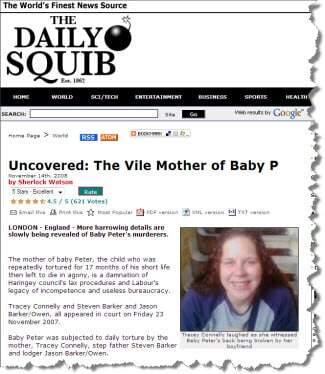Tracey Connolly is clearly a women with serious problems. Apart from now having to face the inevitable psychological turmoil of being publicly named and shamed as the mother of “Baby P”, she also reportedly laughed as her partner, Steven Barker, broke the hapless child’s back. Yesterday the British courts lifted their ban on publishing their names – yet such a ban was itself ridiculous given the fact that the pair had already been named on blogs some 10 months ago.

The court’s reporting restrictions, adhered to by all the mainstream media, were in place for good reasons – the protection of Baby P’s four siblings. Once they were rehomed, the restriction was lifted. But the courts seemed oblivious to the fact that the names were already public knowledge, in spite of the fact that this was reported in the national press. True, they managed to get high profile sites like Facebook to remove the names, but other less conspicuous sites carried the information.
It all reminds me of the time when I was a court reporter for a local newspaper. I was covering a “juicy case”. Two teenage girls had accused a taxi driver of sexual assault. We had all the usual stuff – tearful teenage girls recounting their experiences in court, a “seedy” looking taxi driver, and reporters from the News of the World and the Sun.
However, we were not allowed to identify the taxi driver. The reason? Well, the girls had paid by cheque and he was alleging it was forgery. That in turn would instill doubt in the jury’s mind about the truthfulness of these teenagers. And how did he know it was a forgery? Well, the previous week in the same court room, with the same judge in session, the taxi driver had been convicted himself of cheque forgery. He was his own “expert witness”…!
But even though we couldn’t report the taxi driver’s name or anything that would identify him – everyone knew who he was. In the pubs of the town his name was bandied around, in spite of the court reporting restrictions. Those restrictions were, in reality, worthless.
The same is true nowadays in many cases because of blogging. The courts can deal with national newspapers under contempt laws, but going after bloggers who may not even be based in the UK, is a huge task and, on the basis of the Baby P case appears to be something that is ignored. Yet more people will be reading the blogs than the newspapers. For instance, there are over 400,000 people on the Baby P Name Them and Shame Them cause on Facebook. Yet the latest circulation figures show that, for instance, The Independent, which reported the online naming of Tracey Connelly has only half that number of people buying the paper. As a result, more people appear likely to find things out on Facebook than in The Independent.
Worse still for the courts is the fact that as soon as they manage to shut down one blog post, another will pop up. Even though contempt of court is a serious offence – with a possible prison sentence – few bloggers appear concerned about it. Besides, many aren’t even within the UK courts jurisdiction. The result is millions of people knew about Baby P’s killer, well before the reporting restrictions were lifted.
And, curiously, this has an implication for anyone doing business online – indeed it has implications for every living person. In the past if someone libelled you, if someone disparaged you in any way, you could relatively easily take action, get an apology and seek redress. The offence would have been public in a major publication, for instance. But now, people can say nasty things about you, reveal your secrets, even expose your own wrongdoing, on blogs and social networks anywhere in the world. It means that your secrets are no longer always secret, your reputation is no longer in your complete control and your privacy is not what you thought it once was.
It means you need to monitor what people say about you in blogs, on Facebook or anywhere online. Only by constantly being vigilant about the potential harm people could do to you can you take action against it and get it dealt with in some way. Had the British courts been more watchful about the online reporting of the Baby P case, maybe the mother’s name would not have been revealed online until today.
Early intervention is vital in preventing the spread of harmful misinformation about you or the dissemination of secrets or private information. Earlier online intervention in the Baby P case may well have reduced the social pressure of online vigilante groups. The result of their success is going to be a huge bill for the taxpayers. Don’t let your company face large bills, legal worries or the psychological trauma of coping with a falsely tarnished reputation. Instead, make sure you act now – and every day – to monitor what is being said about you or your business online. Only by doing that can you hope to prevent bloggers and social networkers reporting things about you that you don’t want other people to know – even if they are true.
And perhaps the Baby P case provides us with another thing to think about. One day Baby P’s four siblings will be able to read what people said about their mother online. They will be able to see the hatred and vitriol being poured out against her. And they will be able to read the gruesome details of what happened to Baby P.
If you don’t control what is said about you online, one day your children and grand children will read it. Do you want them to?

